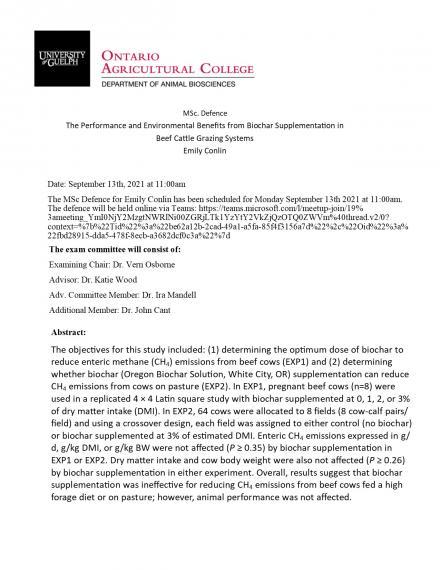Emily Conlin's MSc Defence
Date and Time
Location
Teams: https://teams.microsoft.com/l/meetup-join/19%3ameeting_YmI0NjY2MzgtNWRlNi00ZGRjLTk1YzYtY2VkZjQzOTQ0ZWVm%40thread.v2/0?context=%7b%22Tid%22%3a%22be62a12b-2cad-49a1-a5fa-85f4f3156a7d%22%2c%22Oid%22%3a%22fbd28915-dda5-478f-8ecb-a3682dcf0c3a%22%7d

Details
The objectives for this study included: (1) determining the optimum dose of biochar to reduce enteric methane (CH4) emissions from beef cows (EXP1) and (2) determining whether biochar (Oregon Biochar Solution, White City, OR) supplementation can reduce CH4 emissions from cows on pasture (EXP2). In EXP1, pregnant beef cows (n=8) were used in a replicated 4 × 4 Latin square study with biochar supplemented at 0, 1, 2, or 3% of dry matter intake (DMI). In EXP2, 64 cows were allocated to 8 fields (8 cow-calf pairs/field) and using a crossover design, each field was assigned to either control (no biochar) or biochar supplemented at 3% of estimated DMI. Enteric CH4 emissions expressed in g/d, g/kg DMI, or g/kg BW were not affected (P ≥ 0.35) by biochar supplementation in EXP1 or EXP2. Dry matter intake and cow body weight were also not affected (P ≥ 0.26) by biochar supplementation in either experiment. Overall, results suggest that biochar supplementation was ineffective for reducing CH4 emissions from beef cows fed a high forage diet or on pasture; however, animal performance was not affected.